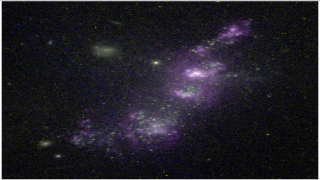Bibcode
Sánchez-Menguiano, L.; Sánchez Almeida, J.
Bibliographical reference
The Astrophysical Journal Letters, Volume 878, Issue 1, article id. L6, 5 pp. (2019).
Advertised on:
6
2019
Citations
23
Refereed citations
22
Description
The fundamental metallicity relation (FMR) states that galaxies of the
same stellar mass but larger star formation rate (SFR) tend to have
smaller gas-phase metallicity (< {Z}g> ). It is thought
to be fundamental because it naturally arises from the stochastic
feeding of star formation from external metal-poor gas accretion, a
process extremely elusive to observe but essential according the
cosmological simulations of galaxy formation. In this Letter, we show
how the FMR emerges from the local anti-correlation between SFR surface
density and Z g recently observed to exist in disk
galaxies. We analytically derive the global FMR from the local law, and
then show that both relations agree quantitatively when considering the
star-forming galaxies of the Mapping Nearby Galaxies at APO (MaNGA)
survey. Thus, understanding the FMR becomes equivalent to understanding
the origin of the anti-correlation between SFR and metallicity followed
by the set of star-forming regions of any typical galaxy. The
correspondence between local and global laws is not specific to the FMR,
so that a number of local relations should exist that are associated
with known global relations.
Related projects

Starbursts in Galaxies GEFE
Starsbursts play a key role in the cosmic evolution of galaxies, and thus in the star formation (SF) history of the universe, the production of metals, and the feedback coupling galaxies with the cosmic web. Extreme SF conditions prevail early on during the formation of the first stars and galaxies, therefore, the starburst phenomenon constitutes a
Casiana
Muñoz Tuñón